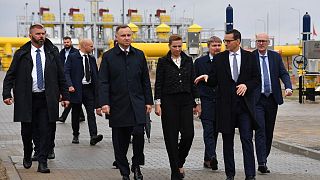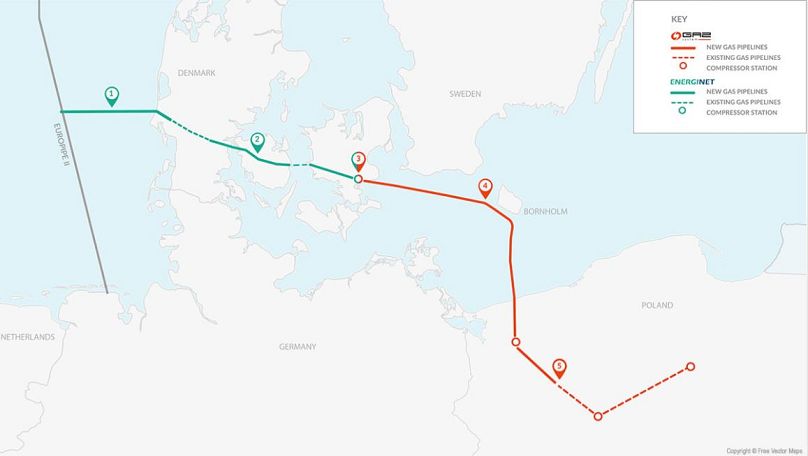Democracy Now!1,34 Mio. Abonnenten
Speichern1.407.283 Aufrufe 15.02.2023 Latest ShowsUPDATE: We have blurred some imagery about 30 seconds into the video in response to a content warning from YouTube that severely limited the reach of this interview. What you see now is an edited version. For the uncensored version of this interview that aired on our show, visit democracynow.org. ==== When the Nord Stream pipelines carrying natural gas from Russia to Germany were damaged last September, U.S. officials were quick to suggest Russia had bombed its own pipelines. But according to a new report by the legendary investigative journalist Seymour Hersh, it was the U.S. Navy that carried out the sabotage, with help from Norway. Citing a source “with direct knowledge of the operational planning,” Hersh writes on his Substack blog that planning for the mission began in December of 2021. The White House and the Norwegian government have since denied the claims. Hersh joins us for an in-depth interview to discuss his report and says the U.S. decision to bomb the pipelines was meant to lock allies into support for Ukraine at a time when some were wavering. “The fear was Europe would walk away from the war,” he says. Hersh won a Pulitzer Prize in 1970 for his reporting on the My Lai massacre. His reporting on CIA spying on antiwar activists during the Vietnam War era helped lead to the formation of the Church Committee, which led to major reforms of the intelligence community, and in 2004, he exposed the Abu Ghraib prisoner abuse scandal in Iraq. Democracy Now! is an independent global news hour that airs on over 1,500 TV and radio stations Monday through Friday. Watch our livestream at https://democracynow.org Mondays to Fridays 8-9 a.m. ET. Support independent media: https://democracynow.org/donate Subscribe to our Daily Email Digest: https://democracynow.org/subscribe#DemocracyNow
Related article:
( Northstream pipeline exlodes),Baltic Pipe: Norway-Poland gas pipeline opens in key move to cut dependency on Russia !!
By Alasdair Sandford with Reuters • Updated: 27/09/2022

Polish President Andrzej Duda, 4th left, Danish PM Mette Frederiksen, 4th right, and Polish PM Mateusz Morawiecki, 2nd right, at the Baltic Pipe inauguration, Budno, 27/9/2022 – Copyright AP Photo
SHARE THIS ARTICLE
Leaders from Poland, Norway and Denmark have attended a ceremony to mark the opening of the new Baltic Pipe, a key stage in the drive to wean Poland and Europe off Russian gas.
The pipeline will transport natural gas from the Norwegian shelf via Denmark and through the Baltic Sea to Poland. It is the centrepiece of a Polish strategy to diversify away from Russia that began years before Moscow’s February invasion of Ukraine triggered a global energy crisis.
The flows from Norway along with supplies via liquefied gas terminals are central to Poland’s plan. The country was cut off from Russian gas supplies in April, allegedly for refusing to pay in roubles.
“The era of Russian domination in the field of gas is coming to an end, the era that was marked by blackmail, threats and extortion,” Polish Prime Minister Mateusz Morawiecki said at the inauguration at Budno in western Poland.
Norwegian Energy Minister Terje Aasland said it was “an important step on the important road to Europe’s independence from Russian energy”.
about:blank
“We must do everything we can to eliminate energy as an instrument of Russian power,” added Danish Prime Minister Mette Frederiksen. “Together we will defeat Putin.”
The inauguration came after Danish and Swedish authorities identified several gas leaks on the Russian-operated Nord Stream pipelines, prompting fears of sabotage.
The Danish system operator Energinet said at the weekend that the Baltic Pipe link could be commissioned at full capacity a month early thanks to good progress on work in Denmark. It brings the planned date forward to the end of November instead of 1 January.
Construction in Denmark had been suspended for nine months for environmental reasons but resumed last March.
“Due to an extraordinary effort on the part of everyone involved, we were able to lay the remaining pipelines faster than expected. Full commissioning can therefore take place ahead of time,” said Torben Brabo, Energinet’s Director of International Relations.

“Baltic Pipe is part of a larger Polish strategy to end dependency on Russian gas flowing through the Yamal pipeline. It was a cornerstone of the plan. The fact that it is being finalised earlier than expected of course comes at a good time, since Poland no longer receives the gas it used to,” Trine Villumsen Berling, senior researcher in global security at the Danish Institute for International Studies (DIIS), told Euronews.
“It was, however, always the Polish plan to stop using Russian gas when the contract with Gazprom ran out by the end of 2022,” she added.
The Polish energy infrastructure minister Mateusz Berger said on Saturday that the completion meant Poland should get double the amount of gas originally expected in the last quarter of the year.
Norway’s Equinor said on Friday it had entered into a 10-year agreement to sell natural gas to Poland’s PGNiG in a deal covering a volume of 2.4 billion cubic metres (bcm) per year, or around 15% of Polish annual consumption. The Baltic Pipe has an annual capacity of 10 bcm.
The contract with Equinor supplements Poland’s liquefied natural gas (LNG) supply, domestic output and potential imports via interconnectors with its neighbours ahead of the coming winter. PGNiG said in a statement last week that it had secured its gas supply for the winter heating season.
- Energy Commissioner Kadri Simson: “we need a price cap for Russian gas”
- Nord Stream: Explosions recorded prior to discovery of major gas leaks
- What are Europe’s energy alternatives now that Russian gas is off the cards?
In late August a gas interconnector between Poland and Slovakia came into operation — a key part of the North-South gas infrastructure corridor between the Baltic Sea, the Adriatic and Aegean Seas, the eastern Mediterranean Sea and the Black Sea.
“This interconnector will significantly improve the EU’s security of supply and resilience of our energy system,” said European Energy Commissioner Kadri Simson. The EU funded more than €100 million, or about 40% of the project costs.
Analysts say the new Baltic Pipe should have benefits for countries beyond Poland.
“The Baltic Pipe will also be important for the Baltic States. They can receive gas through the GIPL — Gas Interconnector Poland Lithuania — the same way Poland has received gas from Lithuania since April,” said Trine Villumsen Berling.
“The corridor is also suitable to transfer gas from Poland to the Danish market, further adding to the flexibility and security of energy supply in the region,” the DIIS said an energy assessment published in July.
It highlighted Poland and Lithuania as having been in the forefront of calls for “greater unity within the EU and stronger sanctions on Russian fossil fuels”.
“Although a number of strategic projects in the Polish and Lithuanian energy sectors are coming to fruition today, they are the outcomes of the two states’ long-term strategic visions of energy independence from Moscow’s grip,” the report said.
https://jeromus.de/produkt-kategorie/alternative-off-grid-systemen/
https://jeromus.de/produkt-kategorie/schermbecker-survival-store-de/

